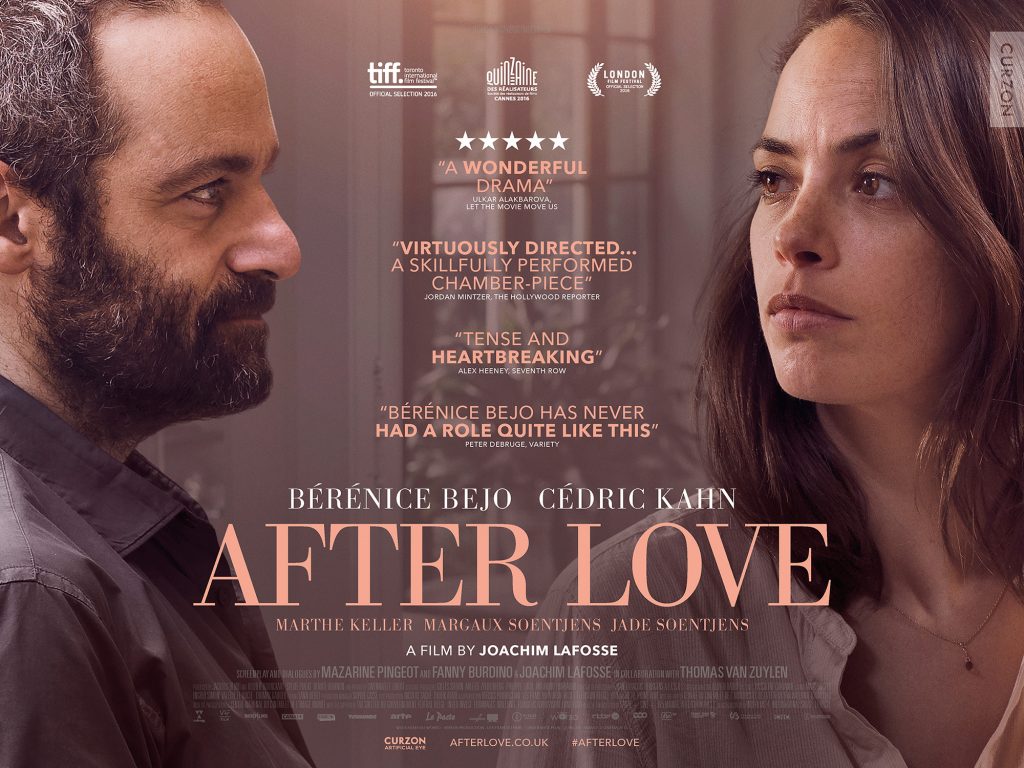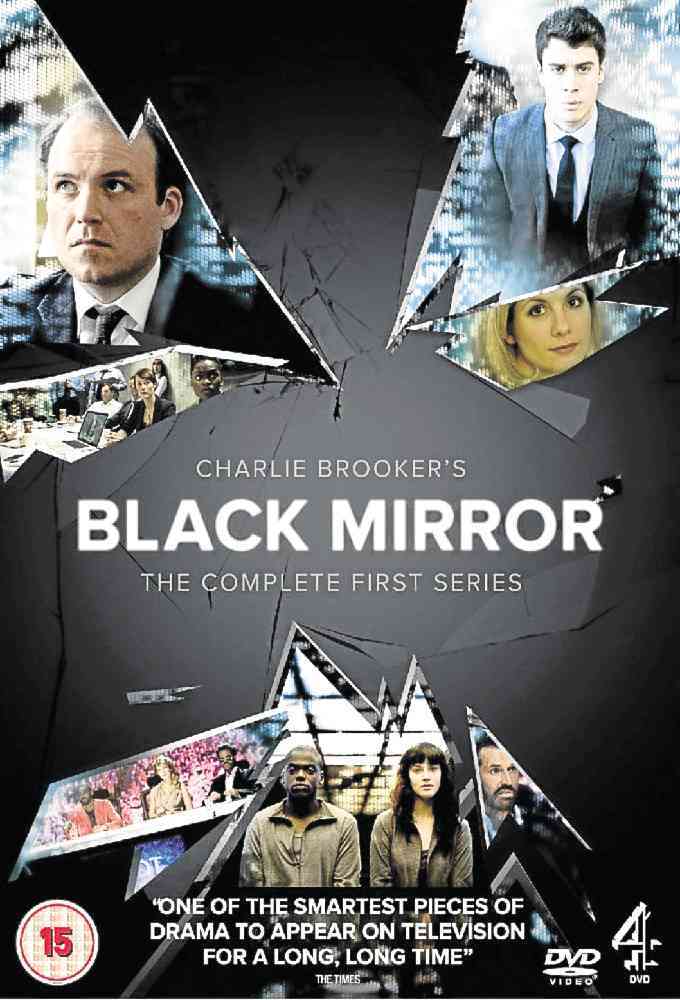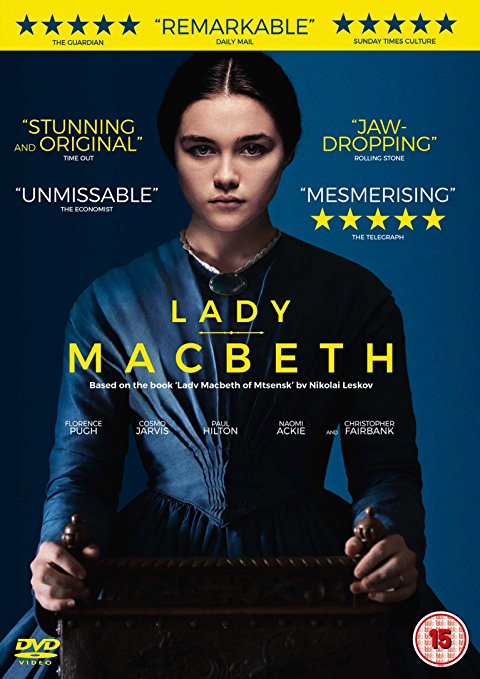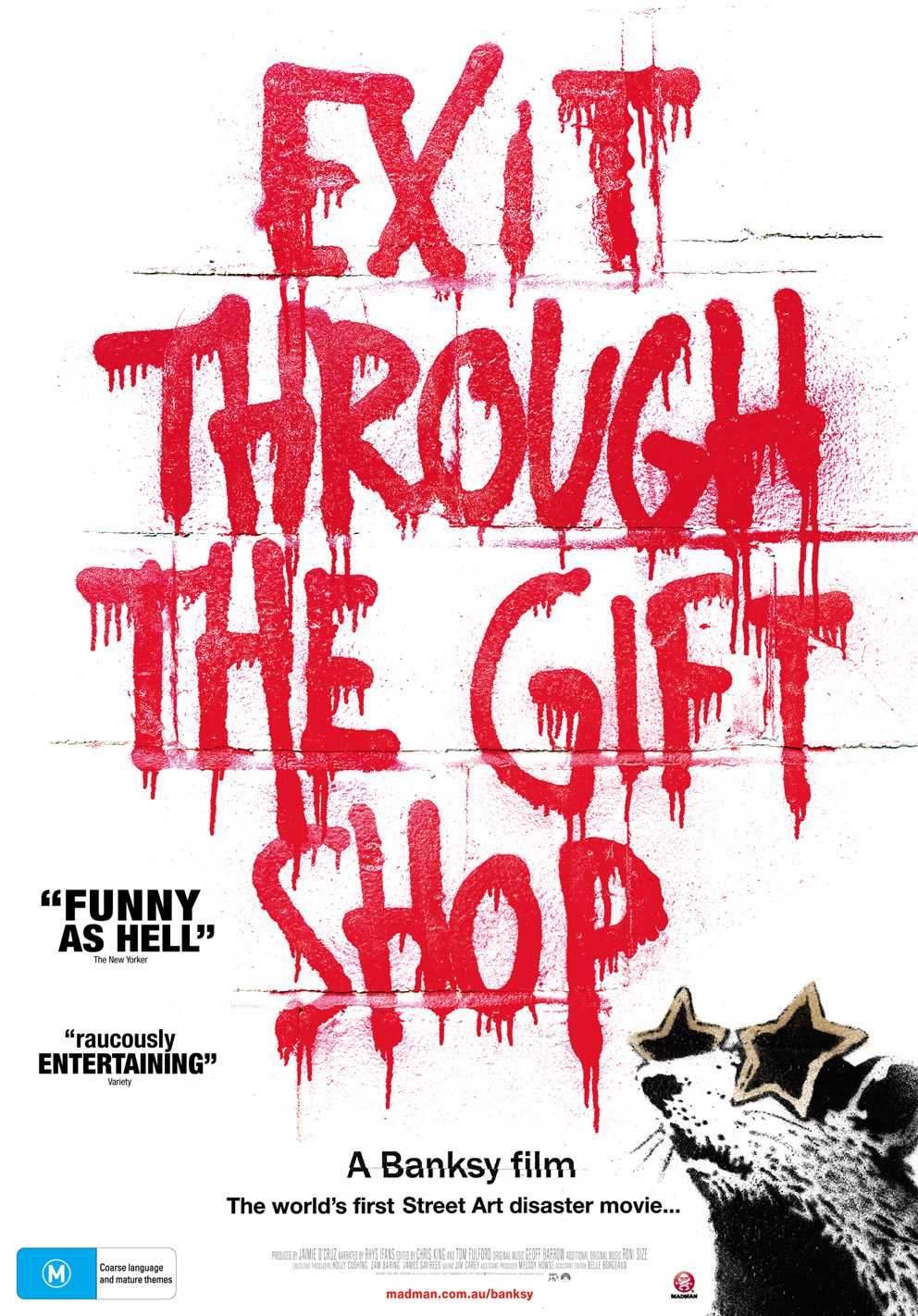Now Playing
Current DJ: Commodore Jones
Xiu Xiu Maestro One Chord from 13" Frank Beltrame Italian Stiletto with Bison Horn Grips (Polyvinyl) Add to Collection
Requests? 773-DJ-SONGS or .(JavaScript must be enabled to view this email address)
Welcome to The Fourth Wall, CHIRP's weekly e-conversation on cinema. This week's subject is the French drama After Love.
This edition is written by CHIRP Radio volunteers Kevin Fullam and Clarence Ewing.
 Clarence:
Clarence:
In Joachim Lafosse’s film After Love, Boris and Marie are a couple separating after 15 years of marriage. They have a big house and a pair of adorable twin daughters. For various reasons, Boris is still living with Marie and the kids in the house that was given to the couple by Marie’s parents. He refuses to leave, she refuses to buy him out, and the audience is witness to the slow-motion crash of a family falling apart.
Strong performances by Cédric Kahn and Bérénice Bejo as two people whose relationship has come to an end are complimented by a beautifully stifling atmosphere from the director and cinematographer Jean-François Hensgens.
Most of the film takes place in the house where the family lives. The former loving couple’s frustration, anger, and resentment are so palpable, they become characters in themselves. The audience is placed at a similar perspective to Boris and Marie’s daughters, friends, and extended family as witnesses to the emotional war between these two people.
I felt like After Love is one of the most apt titles for a film that I’ve seen in a while. But then I saw the film’s original French title, L'Économie du couple (“The Economics of a Couple”), which made even more sense.
Welcome to The Fourth Wall, CHIRP's weekly e-conversation on cinema. This week's subject is Series 1 of the television show Black Mirror.
This edition is written by CHIRP Radio volunteers Kevin Fullam and Clarence Ewing.
 Kevin:
Kevin:
Back when we discussed the film Her, I commented that it's rather unlikely that supercomputers, should they emerge, would purposely seek to destroy humans; it's far more likely that we'd bore them to (digital) tears. (Of course, some worry that they could accidentally destroy us quite easily...)
The real threat of technology in the near future, as seen through the lens of Charlie Booker's anthology series Black Mirror, is the abetting of the unraveling of society from within. Each episode involves a different element of technological "progress" and its ramifications for our world, from the erosion of privacy, to unstoppable terror drones and "virtual" politicians. What was once considered "sci-fi" is no longer too far off in the distance, and the series, in Booker's words, is "about the way we live now -- and the way we might be living in 10 minutes' time if we're clumsy."
I'll start by focusing on the world of "The Entire History of You," my favorite episode of Season 1 of Black Mirror:
Welcome to The Fourth Wall, CHIRP's weekly e-conversation on cinema. This week's subject is the Brad Pitt comedy War Machine.
This edition is written by CHIRP Radio volunteers Kevin Fullam and Clarence Ewing.
 Kevin:
Kevin:
Most of my friends know that I'm a tough crowd with regards to comedy. A very tough crowd. These days, I've generally sworn off seeing comedy films in the theaters -- I've joked (no pun intended) that it's incredibly frustrating to hear folks all around me laughing at bits that I find wanting. Like my own real-life, 360-degree laugh track from hell*? Sometimes I experience this at improv shows and the like as well; it's a twisted dream of mine to have the offending party on stage treated to an audience of Kevin dopplegangers, all with crossed arms and blank stares. Cue the beads of sweat from those on stage. (Clearly, the lesson is that I'm an awful human.)
[*Comedy trailers are worst of all. Humor is all about context, and with trailers, you obviously have zero context. So editors are reduced to using cheap gags and punchlines, often with "full-stop" sound effects for added emphasis.]
It's actually made me think quite a bit about the nature of the genre and the subjective nature of humor. In my estimation, most attempts at comedy in film and television just try too damn hard, and my preferred brand of levity arrives in the midst of tales that are generally on the level. Dramas like The Sopranos and The Wire were wickedly funny at times -- Paulie Walnuts, when he wasn't a vicious sociopath, almost qualified as comedy relief. Clarence, you and I have discussed the genius of Extras in the past; even when celebrities in that series were playing caricatures of themselves, I can't ever remember them winking at the camera.
Which brings us to War Machine, a military satire based on the non-fiction book The Operators, an account of writer Michael Hastings' month-long stay with General Stanley McChrystal's forces in the Afghanistan war. The basis for the book was Hastings' article "The Runaway General," a 2010 feature in Rolling Stone which captured not only the chaos of the fight, but also McChrystal's mocking of White House officials (including VP Joe Biden), which ultimately resulted in his resignation.
Hey, this sounds like a fascinating subject for a film! But couldn't they have gotten someone other than Brad Pitt to play the McChrystal character, Gen. Glen McMahon? I'm guessing Hollywood studios demanded a star. Fine. Then why demand that Pitt utter every line with an overblown, gravely voice? The man sounded like JK Simmons in full-on J. Jonah Jameson mode from the Spider Man films.
Welcome to The Fourth Wall, CHIRP's weekly e-conversation on cinema. This week's subject is the independent film Lady MacBeth.
This edition is written by CHIRP Radio volunteers Kevin Fullam and Clarence Ewing.
 Clarence:
Clarence:
Kevin, from the moment I finished watching Lady MacBeth until now I’ve been thinking deep thoughts. This movie is not my favorite – in fact it might be my least favorite film of the last five years or so. But it did get me thinking that, if I didn’t like this movie (and I definitely didn’t), then why I do like other stories like it?
In this movie, Florence Pugh plays Katherine, a young sociopath who lives on a huge country estate with her husband Alexander and father-in-law, each man not so much a character as a walking list of unpleasant tics. Katherine’s not getting enough affection from her husband, so she takes up with a stable hand (Cosmo Jarvis). When the intrigue of the situation escalates, she starts killing people, much to the chagrin of her black maid and only constant companion Anna (Naomi Ackie).
That’s pretty much the plot of the movie. It features several basic production shortcomings, starting with the lack of a simple time and place title card to let the audience know when and where this story is taking place. Director William Oldroyd and cinematographer Ari Wegner chose to compose the movies using a series of long, quiet, still frames which only result in several unearned jump scares and the movie itself feeling a lot longer than its 90-minute run time. If you’re going to use a technique perfected by Kubrick in Barry Lyndon, you better have more to offer than dead silence and empty rooms.
Also, the overall plot hinges on the resurrection of a particularly ugly film stereotype of the mute black servant whose main role is to be scared of their white master. This isn’t so much an unpleasant “misunderstanding” as a case of a bad filmmaking decision.
There are a lot of unanswered questions about Katherine, but very little is left to the imagination about what she is. She is a victim of abuse, but she’s also anti-social, reckless, and not so much “fierce” as “vicious” in how she deals with her problems and other people. Audience members walking into the theater thinking they’re going to be watching a feminist revisionist fantasy about Victorian-era womanhood will probably change their minds once a child becomes involved with the main character’s wrath.
Welcome to The Fourth Wall, CHIRP's weekly e-conversation on cinema. This week's subject is the 2010 documentary Exit Through the gift Shop.
This edition is written by CHIRP Radio volunteers Kevin Fullam and Clarence Ewing.
 Kevin:
Kevin:
"I think the joke is on... I don’t know who the joke is on, really. I don’t even know if there is a joke."
Who's the arbiter of what constitutes "good" art? Or art, period? You, the reader, probably have better-formed opinions about tunes (this is a CHIRP Radio site, after all), but still, one person's trash is someone else's treasure. There are entire genres of music that I'm unable to digest, but I certainly don't believe that my tastes are any more or less highfalutin' than another's in this regard -- we simply form an immediate physical reaction to the beats and melodies that we hear. Keep in mind that my background in visual arts is pretty rudimentary, but I kinda think this medium works the same way? Most of us simply will know what we like when we see it.
Enter the documentary Exit Through the Gift Shop, a project which originally began as a fly-on-the-wall snapshot of the world of street art by vagabond/vintage-clothing proprietor Thierry Guetta. It then later morphed into a profile of reclusive British graffiti wizard Banksy, but when Banksy couldn't make heads-or-tails of Guetta's finished product (Life Remote Control, which Banksy describes as "an hour and a half of unwatchable nightmare trailers"), Banksy decided to commandeer Guetta's tapes and take a stab at stitching together the film.
The result? A profile of Guetta himself, who runs with Banksy's offhand suggestion of creating his own street art, and sinks his life savings into a gargantuan Los Angeles art exposition -- a warehouse populated with work that was "conceived" by Guetta but actually produced by artists he employed. While much of his "style" seems incredibly derivative (he's basically an Andy Warhol knockoff), Guetta's ability to generate interest creates the perception that this is cutting-edge art, and it sells like hotcakes to wildly-enthusiastic audiences... while Banksy and the street-art community are left horrified at the monster they've created.